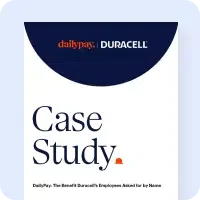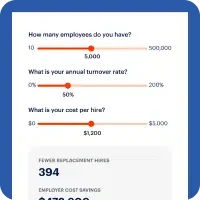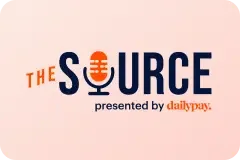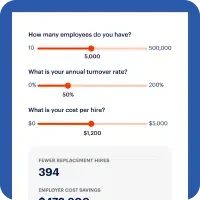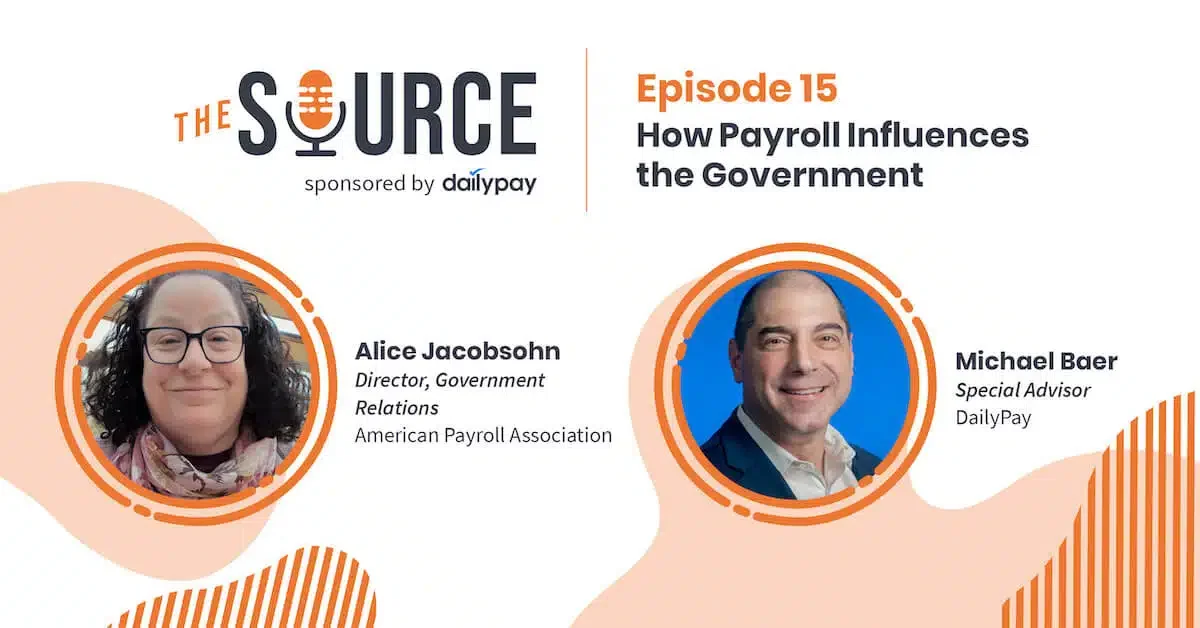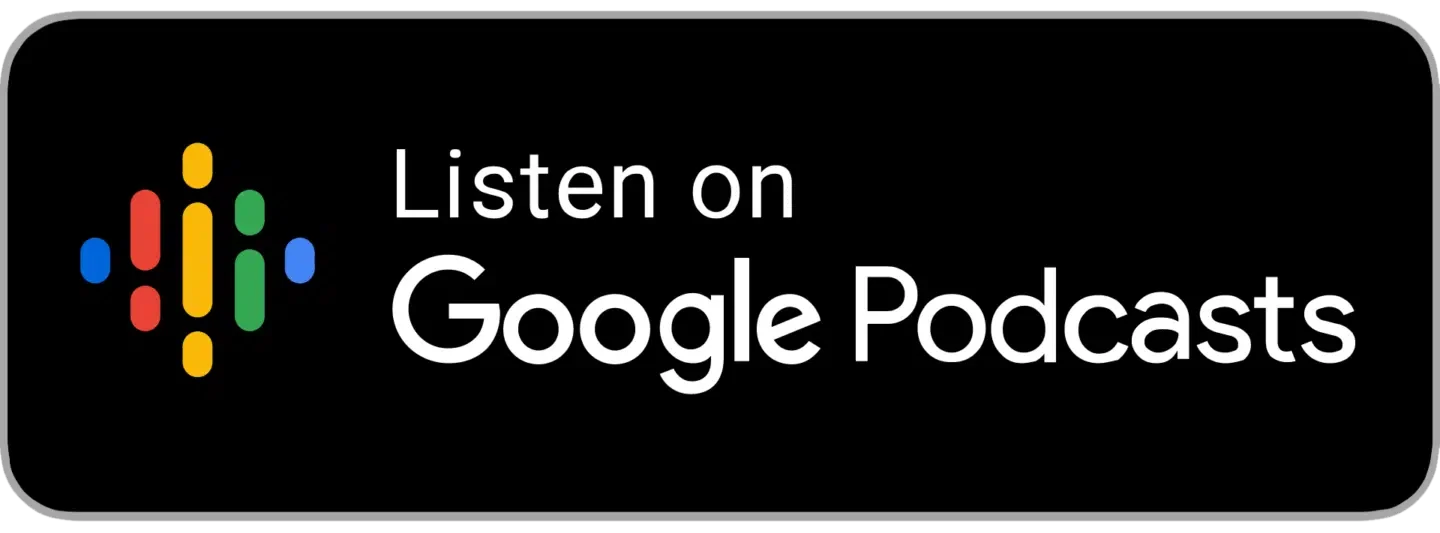About Our Speakers

As Director of Government Relations for the American Payroll Association, Alice Jacobsohn, Esq., is an experienced advocate building bridges between payroll professionals and government legislative and regulatory entities. She has more than 30 years of success in high profile policy, regulation, and advocacy roles. Prior to APA, Ms. Jacobsohn worked as a compliance consultant for private companies assisting with practical approaches to implementing management strategies and business regulations. In addition, she worked for 17 years as a director at the National Waste and Recycling Association developing and implementing educational programs and public relations strategies, managing state chapters and policy-making groups, and lobbying and educating decision-makers. She was a program manager at SEMCOR Inc. advising the U.S. military and private-sector customers on compliance, a staff attorney for a commissioner at the Pennsylvania Public Utility Commission, and legislative assistant to a Pennsylvania state senator.

Michael Baer is the host and executive producer of The Source podcast. Michael previously oversaw domestic and international payroll news and analysis at Bloomberg Tax, previously BNA.
In a career spanning three decades, Michael transformed the role of managing editor, becoming an information services leader who managed every aspect of world-class global products and platforms, while continuously increasing revenue and achieving market-best customer satisfaction. He directed a team of editors and writers who were charged with translating complicated tax and labor laws into English so non-lawyers could easily understand and apply them, and was integral in organizing and placing that content on easy-to-access web platforms, resulting in the highest net promoter scores the company had seen for any of their offerings.
Michael has been a frequent public speaker for conferences and webinars, and now is the host of The Source, sponsored by DailyPay. Michael joined the DailyPay team in 2019.
In this podcast you will learn …
- How the American Payroll Association approaches government relations
- Three key federal issues the APA is addressing
- Concerns the APA has around state taxes and remote workers
- What some new administration initiatives may do to impact payroll
About this podcast and transcript:
Welcome to The Source, the definitive destination for timely and informative regulatory updates and issues in the on demand pay industry.
The Source is brought to you by DailyPay the industry leading provider of the DailyPay benefit and pay experience.
This material is for general information only. And the views expressed herein reflect only the views of the participants.
This program should be considered marketing material and should not be relied on as legal, tax, accounting or regulatory advice.
And now let’s welcome our host Michael Baer.
Michael Baer:
Hello everyone and welcome to The Source. The Source is sponsored by DailyPay and provides insights into active and upcoming legislation impacting the on demand pay industry. And with special guests, we help clarify issues surrounding early access to pay and the pay experience. And today I am pleased and honored to have with me, Alice Jacobsohn, Esq. Alice serves as the director of government relations for the American Payroll Association, which is the nation’s leader in payroll, education, publications, and training with more than 20,000 members.
Michael Baer:
Alice has more than 30 years of success in high profile policy, regulation and advocacy roles. Prior to joining APA, she worked in both the public and private sectors assisting companies with practical approaches to implementing management strategies and business regulations and on the public sector side held attorney and legislative roles in Pennsylvania. She specializes in building bridges between payroll professionals and government legislative and regulatory entities. Alice, welcome.
Alice Jacobsohn:
Glad to be here, Mike.
Michael Baer:
Wonderful. Okay. Let’s get started. Government relations focused on payroll can be narrow, in that the primary concerns you have are for members of the payroll community, specifically their jobs and their ability to follow through on new provisions that are being considered or enacted. Yet, there are a broad set of issues that fall under the payroll scope. We have tax and wage and hour issues, benefits, child support, garnishments, wage payment mechanisms, of course, which is near and dear to us and even immigration and alien employment. There are a few other things on this list I’m sure I’m missing out on. Alice, could you please tell us a little more about the scope of your role at the APA and how APA approaches navigating through the myriad issues here?
Alice Jacobsohn:
Sure. So APA members are located across the United States and as such, they have a myriad of different political viewpoints. So in general, APA does not take positions on controversial issues, or siding with one party or the other. Instead our focus is on proposed legislation with potential impacts on payroll administration, legislation or regulations that would interfere with payroll best practices, or they could impact an employer’s decision-making process. We prefer to work with legislators and regulators as partners, even when we disagree. And I’ll give you an example of that, Mike. APA does not take a position on immigration related to who’s allowed into the country. Our focus is on employment, onboarding and verification of employment.
Alice Jacobsohn:
On the federal minimum wage, you may have seen some press coverage about proposed legislation to increase the federal minimum wage. For APA, we didn’t get involved in what that amount should be. Instead, we asked Congress for a phased approach so that payroll managers would have sufficient time to implement the changes in particular to compare federal requirements and state requirements, to make sure that they’re in full compliance.
Michael Baer:
Wow. And I think you hit on something there, Alice, that payroll, with the immigration and the onboarding, payroll is involved in the entire cycle of employment from hiring and onboarding, as you mentioned that first paycheck to changes in pay rates all the way through the final pay at termination. And all of these activities are regulated. Can you give me a list, just give us maybe an alphabet list of acronyms maybe that might be recognizable of all the variety of federal and state agencies that you and your team have to deal with on a regular basis?
Alice Jacobsohn:
Well, let’s see. When it comes to acronyms, there’s probably far too many for our talk today, but, let me give you some ideas of the agencies that we deal with. Obviously there are some agencies that we would deal with on a more regular basis, such as the Internal Revenue Service, the Department of Labor. And then there are some not so obvious agencies, there’s the Small Business Administration for those who have been paying attention to all the COVID relief, the Paycheck Protection Program that offered some loans to small businesses that was managed by the Small Business Administration.
Alice Jacobsohn:
The Equal Employment Opportunity Commission, in addition to some general concepts of discriminatory practices in the workplace to do that. One of the tools they were looking at is payroll data. And so still pending out there is the EEOC look at how they might collect that information. And then there’s the Consumer Financial Protection Bureau. They look at issues such as whether some help to employees in the workplace would be considered a loan or the management of payroll cards and how to protect consumers when they’re using those cards. So those are some of the agencies that we deal with.
Michael Baer:
Wow. Yeah. I’ve seen that, that you have to kind of be a little bit of an expert in some of these other areas of regulatory provisions, because they all touch the payroll process. Moving on to the issues you and APA are addressing now, the biggest ones. Let’s start with on the federal side, what are some of the biggest issues APA is seeing right now and addressing with government agencies and the legislature?
Alice Jacobsohn:
At the federal level right now, we’re really focused on three issues. One, is working with agencies on modernization that includes the Social Security Administration, Internal Revenue Service and the Office of Child Support Enforcement. The second issue is unemployment insurance and the third one is on the management of employment taxes.
Michael Baer:
Wow. Okay. So touching on that first issue, how is APA supporting payroll and working with the agencies on these modernization efforts?
Alice Jacobsohn:
So at the Social Security Administration, they have a five-year modernization project. Our area is dealing with their business services online, such as the uploading of the forms W2. And so our members first, they were interviewed by the Social Security Administration on how they use the online services. And then the second part of it was working with members on different aspects of it, certain modules. And now members are in the midst of a pilot program to upload their forms under the new system. That system will be revealed for everybody at the end of December this year, 2021. So that’s the Social Security Administration.
Alice Jacobsohn:
The internal revenue service also has a long-term project. They’ve been looking at some infrastructure issues of setting up a new information technology department to really focus on some of the antiquated systems that they have there for tax filing. And then at the Office of Child Support Enforcement, we have a child support portal that allows both States and employers to share information. The problem is that there were some gaps there about what information could be shared. And so we’ve asked OCSE to make some improvements there. We’re expecting the unveiling of that in that June timeframe of this year. So hopefully we can enhance that communication.
Michael Baer:
I’m thinking this is all in the effort to lessen maybe some of the burdens on employers and payroll teams in terms of their interfaces with SSA, IRS and in this case, and there was another agency that Health and Human Services agency oversees the Office of Child Support Enforcement. Those three are key right now for you to try to make or influence, I guess, the development of these systems and make them more amenable to or compatible with a lot of the payroll systems that are out there now, is that appropriate?
Alice Jacobsohn:
Yeah, most of our members and probably most employers out there are using some computer or electronic technology. And it certainly saves a huge amount of time to be able to interact with agencies and to do filing electronically. And I think that became even more apparent under this COVID-19 pandemic where dealing with things like the mail when nobody’s in the office, but they’re working from home or some other remote location, that has become critical both for the agencies and employers.
Michael Baer:
Okay. And then let’s move on to that second issue you mentioned unemployment insurance. How is payroll involved in that issue? And you’re listing that under the federal side. I know states administer this as well. So we’re going to talk about states later, but feel free to include state issues in here as I ask this question. How is payroll involved in this unemployment issue? And I guess that segues pretty well with the COVID-19. I think that I’m anticipating, you’re going to be talking about how the government has reacted on the unemployment side post pandemic. And am I right?
Alice Jacobsohn:
You are correct. So the unemployment insurance system was created in 1938. And the infrastructure of it hasn’t really changed over the years, even though the amounts and so forth may have changed. So that’s part of the problem that came out under COVID-19. On the federal government side, there were contributions if you will, from the federal government to state unemployment systems, in order to get money to individuals who were unfortunately displaced because of COVID.
Alice Jacobsohn:
What has happened though, is that on the state level, there have been individuals who have received the money that were not entitled to it. There were some data issues with people who were employed and being listed as receiving unemployment money. And there’s also been a fair amount of fraud that has taken place. Normally the concept for unemployment insurance is that an employer plays a role in contributing to unemployment when an employee is terminated.
Alice Jacobsohn:
And so the employer should contribute to that and that’s how that was set up. But in this case, the fault is not with the employer or even with the market. It is an unfortunate situation. So when the rates get set for the employer, that becomes a problem. And of course, unemployment insurance is paid for, some of it is through payroll with the calculation of the contribution amounts by the employer on the rate side, some of it is on the employee side on some States do require employee contributions. On a larger scale, payroll professionals are often part of a team at the employer operations.
Alice Jacobsohn:
So, you may have your C-suite, you may have somebody from payroll and HR, the legal department, if they’re large enough, they may have a separate benefits or tax department, and there’s a lot of overlap there. And so payroll professionals often need to know more than just what they do daily in order to contribute to those conversations.
Michael Baer:
Right. And all that, unemployment data it comes from payroll. I mean, in terms of the data that comes from hours worked and the amount of hours somebody worked in a particular quarter, that kind of stuff has to be transferred, and it all draws from payroll. And then, I guess, the rates are assigned and those amounts have to be paid. Well, the unemployment issue is going to be looming into the near future too. My understanding is that there are a number of States that had the borrow from the federal government to cover, because their unemployment trust funds had diminished so much. How is that going to impact employers and payroll possibly later on?
Alice Jacobsohn:
Well, the rates that get set on the state level get transferred to rates from an employer, those rates are based on the numbers or the percentages of employees that an employer has terminated in terms of how much an employer is tapping into those state funds. In this case though, employers may have been tapping into those funds due to no fault of their own, as I had mentioned. And so, if you’re going to establish rates, then how do you set those rates in fairness? But at the same time, somebody has to come up with some money to cover this. You can’t leave people out there with no ability to feed themselves and their children, so that’s part of the issue. And we’re going to have to wait and see what’s going to happen in the long-term. It’ll depends somewhat on the recovery when we get to that new normal and what that’s going to look like.
Michael Baer:
Well, so the future is uncertain right now, it sounds like what you’re saying. But APA is involved in that and doing what it can, I guess, to advocate for the payroll community in these issues. Okay. Well, what about, the third issue? You mentioned employment tax management, what’s going on there?
Alice Jacobsohn:
Well, so out of payroll, the operations include withholding from employees, pay for local state and federal taxes, for social security and Medicare, that is included in that. And of course, that also translates to the percentages of taxes, employment, taxes that employers will pay. So those are ongoing issues. Some of it is the changing forms and instructions that we get out of agencies like the Internal Revenue Service. We need to make sure that the payroll departments understand the requirement. And also to make sure that employees understand what they’re required to do so that they don’t provide incorrect information to payroll for their withholding. So those are ongoing issues.
Alice Jacobsohn:
Every time they change the tax law, you’re going to see changes to the forms and publications as tools for implementation. There is also, unfortunately under COVID when Congress was looking at the stimulus payments, one option they had been looking at was to defer some of those payroll taxes. And for APA, we went into Congress and we said, “That’s a novel idea, but our payroll systems cannot turn over that quickly to accommodate.” And we convinced them that the best approach would be a direct stimulus payment to individuals rather than running it through payroll in doing that.
Alice Jacobsohn:
And of course the Trump administration thought differently, and through a memo that former president Trump had put out then, so the federal government did defer those payroll amounts. And so we did, and of course, some employers did as well in the private sector. And so then the question is, how is that money going to be paid back? Like I said, it was deferred, it was not relieved. And initially the IRS had put out a requirement to pay it back in the first quarter of the year. The problem with that of course, is that employees would be paying their current taxes and then that deferred amount on top of it. And so, Congress has now stepped in to extend that timeframe so that the payback will be on a more incremental level. So we keep watching those kinds of issues to see what’s going to happen. On the federal level, we’ll just have to wait and see,
Michael Baer:
Okay. Well, it does sound like that. And we were going to talk about that later. What influence does the payroll community have there? Sounds like a relatively large one when it comes to determining that stimulus checks should be done instead of some payroll tax or employment tax rollback. And speaking of, let’s move on staying on the federal side, now that we do have a new administration, what new initiatives or requirements do you think will get some traction during the early part of this Biden administration? I’m curious, is there a big change in personnel that you deal with as this new team took over or were you pretty much dealing with the same folks? So two questions there.
Alice Jacobsohn:
Sure. Anytime you have a new administration, you’re going to see some changes. Obviously there were promises made on the campaign trail that new leaders want to implement. And so you can see a shifting that can be a more radical shift depending on who the individual is that ends up in the white house and which party that ends up being in the leadership roles. Obviously there’s been a very big transition from the Trump administration to the Biden administration. Biden is much more focused on employees on the labor side. Although he also has an interest on the business side, unfortunately, he got brought in the middle of this COVID relief. And so I think we’re going to continue to see more efforts on the COVID side.
Alice Jacobsohn:
I think that’s also going to depend on how quickly the vaccines can get out and people can get back to work and what that’s going to look like. And so there’s a bit of unknown there. We’ve already seen some expansion of the affordable CARE Act under some of the relief measures for COVID. But I think there’s going to be additional focus on some of the health issues that are out there and what opportunities might be available for employers and employees. Of course there’s always tax reform issues. I think every administration looks at those issues of where taxes should be located in the sense of not necessarily what the rates should be. Although there have been some rumblings about how much the top 1% pays. We at APA don’t generally get involved in that kind of thing, unless there’s a shift in the percentage for purposes of withholding and there may be new forms and instructions with that.
Alice Jacobsohn:
We have direct and indirect impacts. The fact is with the Democrats controlling both the house and the Senate, if they can manage to stick together and even get some support from the Republicans, a lot of the measures that they’re interested in can go through. The difficulty is going to be on anything that is considered budget or appropriations where in the Senate they’re going to need 60 votes, not 51. And that’s going to be much harder to pass. We’re already seeing some changes with the Biden administration. For payroll you look at the overtime rules, the Obama administration wanted them fairly high. The court wasn’t thrilled with that so it went back to the agency. Under the Trump administration he increased it, but at a lesser amount than the Obama administration. The Biden administration wants to look at that again and see what those numbers should be.
Alice Jacobsohn:
So we’re likely to see some changes there. There have been some changes, under the Trump administration, he put out some new tip pay requirements. And some of that was related to employees who are not normally tipped and whether they can receive some tips. The concern there was making sure that employers could not tap into that. How do you deal with managers who may also serve in positions that are normally tipped? And so the Biden administration has already announced that they’re going to be looking at some of those issues. There’s a lot of rumbling of those sorts of things that are floating around and we’ll see what’s going to go through.
Michael Baer:
So I guess on the federal side, the most normal thing is, there’s going to be change. Probably more change for payroll in terms of these issues. And, like you said, I guess if these things actually pass Congress and get into law, then there’s going to be some new laws to deal with, but certainly it sounds like already you’ve taken some action on some of the Trump administration regulations to, I guess the term is roll back, some of these or reassess some of these things, am I right?
Alice Jacobsohn:
That’s correct.
Michael Baer:
Okay. Well, let’s move on to the state side. There is this issue of how States have reacted to the pandemic. Maybe, in a broad sense, there’s this natural inclination when it comes to say wage an hour or tax issues, many of them piggyback on federal initiatives. Some do, some do not. But, what sort of issues that are high up on the list that your team is working on with the States? And I know we just talked about unemployment insurance, that’s one issue for sure. But what are the issues with the States that APA is most concerned with right now?
Alice Jacobsohn:
I think the biggest issue for us on the state side is what’s referred to as temporary presence, then business nexus, and just a little background. An employee will pay taxes based on where they work, in most cases. Normally before COVID an employee went to a particular location, or if even if they were working remotely at that point, they were in a location. And now because of the shifting of locations for employees, they may be located in a different place. Historically looking at temporary presence, it was usually, it’s already days on average across the country, although there’s state variations. But COVID has taken on a much longer period of time. And so we run into, what’s the definition of temporary in terms of where an employee should be paying their taxes.
Alice Jacobsohn:
And that of course translates to the employer side of where employers should be paying taxes. And there’s been some fights on the state level already, but for our members just figuring out what they should do. Some States said, “Hey, whatever you were doing before COVID just keep doing that.” But now it may look a little different and of course, employees have also moved around on the basis of, “Well, if I’m going to be working remotely, why not work in a state that doesn’t have employment taxes.” Or so forth. You’re seeing some of those shifts.
Alice Jacobsohn:
When an employee works in a particular area, in addition to the employment taxes, if it’s a state, for example, that an employer had not been doing business in before there may be all kinds of requirements there. There may be a registration requirement. There may be employer taxes associated with that and that could be at the local or the state level. There could be when it comes to health coverage, we don’t have a national health system where you get the same insurance in Pennsylvania as you do in California. And so if you have an employee that is now working in a state that the employer wasn’t in before, then they may have to obtain different healthcare coverage for that employee.
Alice Jacobsohn:
So there’s a lot of this trickle out effect of impact. But I think for our members, one of the biggest issues there is just knowing where an employee is located. Getting direct deposit and you don’t even know where they’re located in order to even figure out those taxes. So that’s a big issue for us. And another area that we’re seeing trending a little bit, we’re starting to see some state, proposals on what’s called earned wage access or on-demand pay. I think you mentioned that at the beginning of this, in terms of The Source that you’re doing here. So just for our audience, with earned wage access and employer at least in terms of payroll impacts, an employer will make an arrangement with a service providers such as DailyPay. And there’s some data sharing regarding the payroll data and an employee is interested, can then sign up and get their pay earlier than the regular payday.
Alice Jacobsohn:
And of course, there’s a number of transactions and issues there, which I won’t get into. But, we’re starting to see some proposed legislation there. Some of it’s good, some of it isn’t. We opposed approaches in California and in New Jersey. Although the second round in New Jersey seems to be an improved approach. That’s still in play. We don’t know what’s going to be in California. We’ve also seen bills in, like Nevada and then Georgia. So some of them have been very favorable. I mentioned earlier the employer decision making process. And that’s a critical issue for us is that, we want employers who know their employees better than anybody to be able to select a program that makes perfect sense for the employer and their operations rather than being dictated or restricted on what they can do.
Michael Baer:
All right. And so, some other issues bubbling up in the States we had discussed before you were saying there’s for example, security and privacy bills and some other proposals that APA has been involved in, on the state level, is that right?
Alice Jacobsohn:
That’s true. California came out first with protections for privacy. We got in on the fray of that when the legislation was proposed, because there is certain data that an employer must collect through other rules and regulations at the federal and state levels. There is data that an employer needs to run its business, and there is data that needs to be shared with third party vendors. I mentioned the earned wage access, but if a company outsources some or all of its payroll operations to a payroll service provider, there is data sharing. So we were able to carve out that employment aspect from the California bill.
Alice Jacobsohn:
There’s a possibility that we might see some of that coming back in. I think COVID has delayed any proposals on that, but, we’ll see what happens there. And there are other States that have put in some requirements for biometrics, such as fingerprinting and other kinds of things in the workplace. Those are to some degree indirect. Some of those kinds of things, because payroll obviously is part of the larger employer community. And so if an employer has certain restrictions on the use of who gets to play in the payroll system to make sure that employees are paid on time, there’s a whole lot of security issues and privacy issues there that payroll managers have to pay attention to.
Michael Baer:
Sure. Absolutely. Well switching a little bit to your personal involvement with the APA and doing government relations for them. How has that experience impacted your view of payroll in general? And has that impacted your view of the governments involved?
Alice Jacobsohn:
Well, I’ve greatly enjoyed working for payroll professionals. I have found them to be very passionate about what they do, but they also have a lot of fun doing what they do and their interactions. In government relations, it’s a people business. And so having people that you can really work with, people like yourself, Mike. And it’s just been really a joy to work at the American Payroll Association. So in my career, I’ve worked with a lot of different agencies, different legislatures, they all have a different culture. And so, you have to learn all those different areas, different philosophies in order to work with them. So, that’s part of the learning curve when you enter a new industry. And even if you’ve worked with the agencies before, when you’re working for a different industry, the relationships are different.
Alice Jacobsohn:
For me, like some of the comments you get for the general community, I never realized just how complicated payroll is and how much the laws and regulations impact how payroll gets managed, and all the different aspects of it. And that continues to expand as employers look at different benefits and different mechanisms. Companies come up with different ways of managing the payroll to make improvements on the electronic side. And our members have to traverse all of that. And our role here is to help them as much as we can.
Michael Baer:
Well, and I think APA is really front and center when it relates to payroll, concerns and representing payroll to government agencies, for sure, the lead organization there. And this is my last question by the way, when do you know that legislators and regulators are really hearing or listening to APA or payroll’s concerns?
Alice Jacobsohn:
So there’s some obvious things. When you see that legislation or regulations have wording in it that you’ve suggested or at least the recommendations, then clearly they have listened. You can also tell if an agency staff contact you, asking for APA input, even if they don’t necessarily accept our input, certainly the conversation at least says that they recognize that payroll is important to what they’re doing. So those are some of the kinds of things that you can look at. It’s obviously much harder when you don’t see your recommendations adopted to know whether they listened, but didn’t go that way. Sometimes you see where the concepts of what you were proposing is there, but not necessarily in the way that you proposed it. So did they accept the concept or did they do it the way someone else suggested? And that was just a little different and it’s the name of the game and the world of government relations.
Michael Baer:
Well, super. Well, that’s about it. Thanks Alice so much for your thoughts on all these things, government relations for payroll and the APA. It’s been very illuminating and a pleasure talking with you today.
Alice Jacobsohn:
Well, it’s been a pleasure talking with you as well, and thanks to DailyPay and also to you for participating at the American Payroll Association, we greatly appreciate it.
Michael Baer:
All right. And we appreciate our engagement and involvement with your organization, for sure. And listeners. I want to thank you for joining us today at The Source. It’s sponsored by DailyPay, and you can get information here on analysis and developments related to pay experiences and dailypay.com and look for the podcast page on that daily pay.com website. Stay healthy and safe and keep your eye on your emails as we will have another compelling issue along with updates very soon. Thank you very much and have a great day.
Speaker 1:
Thanks for attending The Source, brought to you by DailyPay. Join us again next month for up-to-date insight on on demand pay and pay experiences. Keep an eye on your inbox for more information regarding featured guests and new topics.
Who’s DailyPay?
DailyPay, the premier provider of the daily pay benefit, goes beyond financial wellness with a flexible, simple, and compliant pay experience that strengthens the employee-employer bond and significantly enhances the employee experience throughout the enterprise.
CONTACT US
